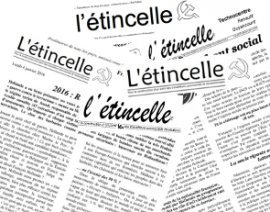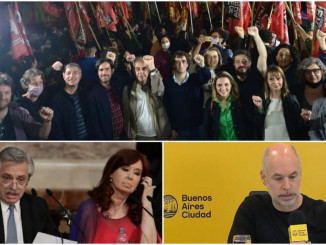
Last weekend, humanitarian aid was blocked at the border between Venezuela and Colombia. With the support of Donald Trump, as well as Emmanuel Macron, Juan Guaido proclaimed himself president in place of Nicolas Maduro. Is this conservative up-and-comer a defender of democracy? His story does not hold water.
For a month, the US, EU, and reactionary Latin American governments have put pressure to end Maduro’s regime. The few promised “humanitarian help” boxes are nothing compared to the economic sanctions imposed by Trump, who also mentioned he is ready for military intervention.
And yet, Maduro’s regime, like Chavez’ before him, is far from “socialist,” and far from helping the poor. Officer Hugo Chavez had been elected in 1998 with support from the army, becoming president of a country in the midst of social and economic crisis. The rise in oil prices that followed allowed his government to take a few social measures. While this inconvenienced a part of the Venezuelan bourgeoisie with links to the US, Chavez never intended to attack banks or big business. Corruption in his government eroded his popularity. After crashing oil prices ruined the economy, the population ended up living in poverty. This seems to be the opportunity for the US and other great powers to get rid of a regime that they think is not favourable enough to their interests.
There is no supreme saviour, no more Maduro than Chavez than Lula in Brazil where a far-right politician used the crisis to take power. Neither is Guaido, sold to the Venezuelan bourgeoisie and the US. Against deepening poverty in Latin America, workers can only count on their fights.
No to racism, antisemitism, and their political exploitation
Since the anti-Semitic insults thrown at Alain Finkielkraut, government and politicians have had a field day vilifying the yellow jackets movement. An opportunity to forget demands about social justice, reinstating the tax on wealth, or increasing purchasing power.
For over a week, all the government’s representatives were on the offensive, They got a lot of help from hate exploiters like Soral and Dieudonne, as well as their friends on the far-right who try to spread their foul ideas at yellow jacket gatherings. But these class enemy make up a small minority in demonstrations. They get expelled from marches, as happened in Lyon two weeks ago, and they get booed in many assemblies. Last Saturday, many banners against racism and antisemitism appeared in the demonstrations.
The ones who light the fuse
Emmanuel Macron can criticise racism all he wants, this does not change his racist anti-migrant policy and cannot make us forget he welcomed, in June 2018, the head of Israel’s far right government, Benyamin Netanyahu. He used the opportunity to mix up antisemitism and antizionism, to discredit all critics of Israel’s policy – including the organised colonisation of Palestinian territories.
Using all their tricks…
Faced with racism accusations, the yellow jackets mobilisation was predicted to weaken. But in fact the number of demonstrators increased last Saturday.
Still shaken by this unending movement, the government used its roughest trick to try and slander the people who fight them. Faced with such hypocrisy, a large number of yellow jackets condemned all kinds of prejudice, xenophobia, racism, and antisemitism. But after three months of fight, the most important topics are social justice, wages, and sharing the wealth. With all due respect to the richest, those who cling to their privileges, and those who serve them…


